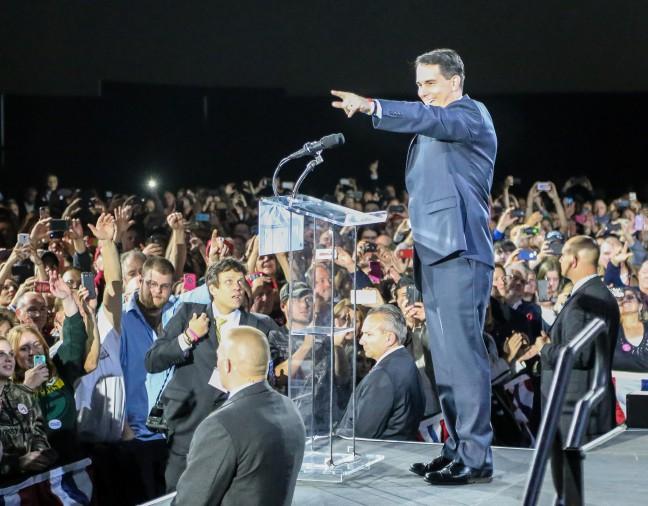Gov. Scott Walker’s possible presidential bid remains unofficial, but experts say parts of his proposed 2015-17 biennial budget could serve as fuel for the road to the White House.
Walker’s proposal calls for some heavily-debated cuts in funding to the University of Wisconsin System and other state departments over the next two years. Although controversial in Wisconsin, his proposal has received national recognition from Republican politicians and voters.
Walker’s political intentions are still undeclared. However, he has begun to raise a campaign budget for a presidential run, Michael Wagner, a UW professor in the School of Journalism and Mass Communication said.
“His cuts in the proposed budget tend to play well with Republican primary voters,” Wagner said.
Wagner pointed to Walker’s steepest cuts – most of which are in commonly liberal-supported areas like education and environmental policy.
Walker proposed a $300 million cut to the UW System’s state funding and an additional two year tuition freeze, as well as granting the system more autonomy through a transition to a public authority model.
In addition to proposed changes to higher education, the governor aims to end the enrollment cap on the statewide school voucher program, an income-based, K-12 private school grant program that he originally introduced in his last biennial budget.
The Department of Natural Resources will take on several major changes under the proposed budget as well. The governor requested a moratorium on land purchases under the Knowles-Nelson Stewardship grant program, the elimination of 66 agency positions and the removal of authority from the Natural Resources Board.
But Dietram Scheufele, a UW professor in the Life Sciences Communication Department, said Walker “isn’t fooling anyone.”
“It’s clear he has national intentions, and he hasn’t been very secretive about them,” Scheufele said. “With the budget proposal he’s saying, ‘I can do these things in a liberal state, I’m ready for the national stage.’”
Scheufele believes the budget proposal will be a key piece of legislation for his political resumé.
“It’s not unheard of to create significant legislature to promote you to the presidency,” Scheufele said.
Walker’s budget proposal also frames him as a fiscally conservative candidate, who opposes big government spending – an idea that appeals to the ideological conservative, Scheufele said.
“He would be running for a narrow slice of the electorate, the highly partisan of the partisaned,” Scheufele said. “These are the people who feel strongly about conservative causes.”
To do well in a presidential race, Scheufele said a candidate must do well in Iowa and New Hampshire. With Walker’s message highly tailored to Republican voters, he is already at the top for potential Republican candidates in the Iowa polls, he said.
And Scheufele believes Walker knows how to run a successful campaign. With his two elected terms and successful survival of a recall, the governor has periodically risen to national conversation.
“He’s a good campaigner, which is obvious through his runs for governor,” Scheufele said, “He’s also an instinctual politician, which will make him a formidable opponent.”
However, Wagner remains adamant that although he has received a lot of news coverage it is too soon for these polls to mean anything significant.
“Anything that anybody does right now will be politicized,” Wagner said, “It is too early to say he is a front runner.”
Scheufele would agree that although he would make a good candidate, he couldn’t see him running for another eight years.
What Scheufele could see is Walker running as a vice-presidential candidate who would appeal to the extreme conservatives.
“If I could look in a crystal ball I could see a Jeb Bush and Scott Walker ticket very soon,” Scheufele said, “But only if Hillary Clinton decides to run.”


